|
|
|
Sort Order |
|
|
|
Items / Page
|
|
|
|
|
|
|
| Srl | Item |
| 1 |
ID:
151683
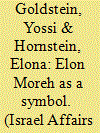

|
|
|
|
|
| Summary/Abstract |
While the establishment of the Elon Moreh locality in the second half of the 1970s constitutes an important milestone in the evolution of post-1967 Jewish settlement in the biblical lands of Judea and Samaria (or the West Bank as they have been known since their 1950 Jordanian annexation), the episode has been surprisingly neglected by the professional literature. This article seeks to fill that lacuna by exploring the factors and circumstances underlying this momentous event, as well as the political and legal struggles attending its occurrence. As such, it not only offers the first comprehensive historical account of this episode but also shed important fresh light on one of the more intractable aspects of the Israeli‒Palestinian conflict.
|
|
|
|
|
|
|
|
|
|
|
|
|
|
|
|
| 2 |
ID:
122068
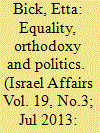

|
|
|
|
|
| Publication |
2013.
|
| Summary/Abstract |
National service was a controversial issue in Israel in the early years of the state. A law requiring religious girls exempted from the military to do two years of mandatory civic service was passed in August 1953 and never implemented. This article examines the political controversy surrounding the adoption of the national service law and concludes that David Ben-Gurion advanced the law mainly for political reasons in order to counterbalance concessions made to the orthodox. Moreover, consistent with his mamlachtiyut (statist) philosophy, he was unwilling to consider any compromise proposals other than a mandatory government-run programme. Pressure from the religious parties caused his successor, Moshe Sharett, to concede on the implementation details, voiding the law of content. Subsequent governments acceded to orthodox demands to freeze the law. In 1971, a more pragmatic Labour government headed by Golda Meir instituted a programme of voluntary national service which provided needed manpower to the development towns and fulfilled the wish of girls from the religious Zionist sector to give service to the nation.
|
|
|
|
|
|
|
|
|
|
|
|
|
|
|
|
| 3 |
ID:
183982
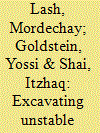

|
|
|
|
|
| Summary/Abstract |
This article examines the factors that influenced the trends in archaeological excavations in Judea and Samaria during the decade attending the 1967 Six-Day War. Examination reveals a close connection between the political trends in Israel as they pertained to Judea and Samaria and the archaeological excavations undertaken in this region. When a prime minister appeared to consider Judea and Samaria an inseparable part of the state of Israel archaeologists followed (Meir). But when prime ministers regarded Judea and Samaria as territory that would be returned to the Jordanians (Eshkol and Rabin), the archaeologists stopped excavating in the region.
|
|
|
|
|
|
|
|
|
|
|
|
|
|
|
|
| 4 |
ID:
186058
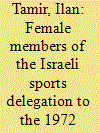

|
|
|
|
|
| Summary/Abstract |
This article discusses the experience and emotions of the two female members of the Israeli delegation to the 1972 Munich Olympics from a 50-year perspective. Interviews with them reveal a complex web of emotions including frustration directed at Germany, the International Olympic Committee, and even the Israeli delegation, which handled the event in a spontaneous and rather unprofessional manner.
|
|
|
|
|
|
|
|
|
|
|
|
|
|
|
|
| 5 |
ID:
171047
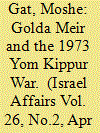

|
|
|
|
|
| Summary/Abstract |
Most historians blame Israeli Prime Minister Golda Meir for the outbreak of the 1973 Yom Kippur War, having allegedly rejected all peace proposals made by Egyptian President Anwar Sadat. In fact, Sadat was adamantly opposed to Meir’s demand for direct negotiations, envisaging political settlement as an American dictate on Israel. The Yom Kippur War shook both sides of their intransigence and brought them closer to each other’s position.
|
|
|
|
|
|
|
|
|
|
|
|
|
|
|
|
| 6 |
ID:
101820


|
|
|
|
|
| Publication |
2011.
|
| Summary/Abstract |
The article deals with Golda Meir, who was a prominent leader of Israel and the Prime Minister during the Yom Kippur War (1973). Its main points are:
Her road towards the national leadership during the "Yishuv" period.
Her political role under David Ben-Gurion and Levi Eshkol as Minister of Labor (1949-1956) and Minister of Foreign Affairs (1956-1966)
Meir as political leader: the way she lead her party and how she was a symbol of the national agreement
Meir as diplomatic leader: her attitude during the negotiation attempt with Egypt (The Secretary of the State's Plan - 1970 ; Moshe Dayan's intention to open the Suez Canal - 1971)
Meir as social leader: the strengthening of the welfare - state
Meir during the Yom Kippur War: The War as a result of her policy; Her leadership during the crisis
|
|
|
|
|
|
|
|
|
|
|
|
|
|
|
|
| 7 |
ID:
164322
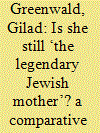

|
|
|
|
|
| Summary/Abstract |
In an attempt to demonstrate how historical changes in public opinion concerning women in politics might be reflected in the media, this article offers an examination of Golda Meir’s 1969 election campaign coverage in the Israeli press compared to Tzipi Livni’s in 2009. Through a gender-focused content analysis of 878 news items, we show how, despite the scholarly argument regarding a ‘gender-blind’ socio-historical attitude towards Meir, the Israeli media discourse did in fact strongly emphasise gender-oriented elements while covering her 1969 candidacy. However, the historical comparison also shows that, with the passage of time, the Israeli press was significantly affected by political personalisation trends, as well as by a growing influence of more conservative voices, and as a result became far more gender-centred and stereotypical in Livni’s case.
|
|
|
|
|
|
|
|
|
|
|
|
|
|
|
|
| 8 |
ID:
103225
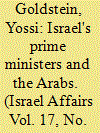

|
|
|
|
|
| Publication |
2011.
|
| Summary/Abstract |
This article identifies similar patterns of behaviour and attitudes towards Arabs and the Arab states among three of Israel's prime ministers in the first 10 years that followed the 1967 war: Levi Eshkol, Golda Meir, and Yitzhak Rabin. All three believed in the right of the Jews to the Land of Israel, in their right to return to their ancient homeland to become a majority, and in the establishment of the state of Israel as the national home of the Jewish people - a state founded on values of democracy and equal of rights for all its citizens. Convinced that the Arabs would never reconcile themselves to Jewish sovereignty in (however small) a part of the Middle East, they believed that Israel must rely on its sword if it were to survive. They differed, nevertheless, over how to achieve these goals. While Eshkol and Rabin believed that Israel should withdraw from most of the territories captured in the 1967 War as a condition for partial (Rabin) or full (Eshkol) peace, Meir did not share this view.
|
|
|
|
|
|
|
|
|
|
|
|
|
|
|
|
| 9 |
ID:
158148
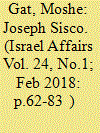

|
|
|
|
|
| Summary/Abstract |
Between 1969 and 1971 US diplomat Joseph Sisco was the driving force behind all initial steps to resolve the Israeli‒Egyptian conflict. But despite his tremendous efforts, his ability was limited as President Nixon did not throw his weight behind these efforts. Three main initiatives were taken during the discussed period: the Rogers Plan, the Rogers Initiative, and Sadat’s initiative for an interim agreement. Most of Sisco’s efforts concentrated on the latter initiative. His failure to reach an interim agreement, coupled with his inability to persuade Israel and Egypt to accept the Rogers Plan, led the region to political stagnation, from which the two parties only emerged in the aftermath of 1973 Yom Kippur War.
|
|
|
|
|
|
|
|
|
|
|
|
|
|
|
|
| 10 |
ID:
103240


|
|
|
|
|
|
|
|